Tinnitus can be a frustrating condition, causing persistent ringing or buzzing in the ears. Many people seek natural remedies to find relief. Essential oils have gained popularity as a potential solution for managing tinnitus symptoms.
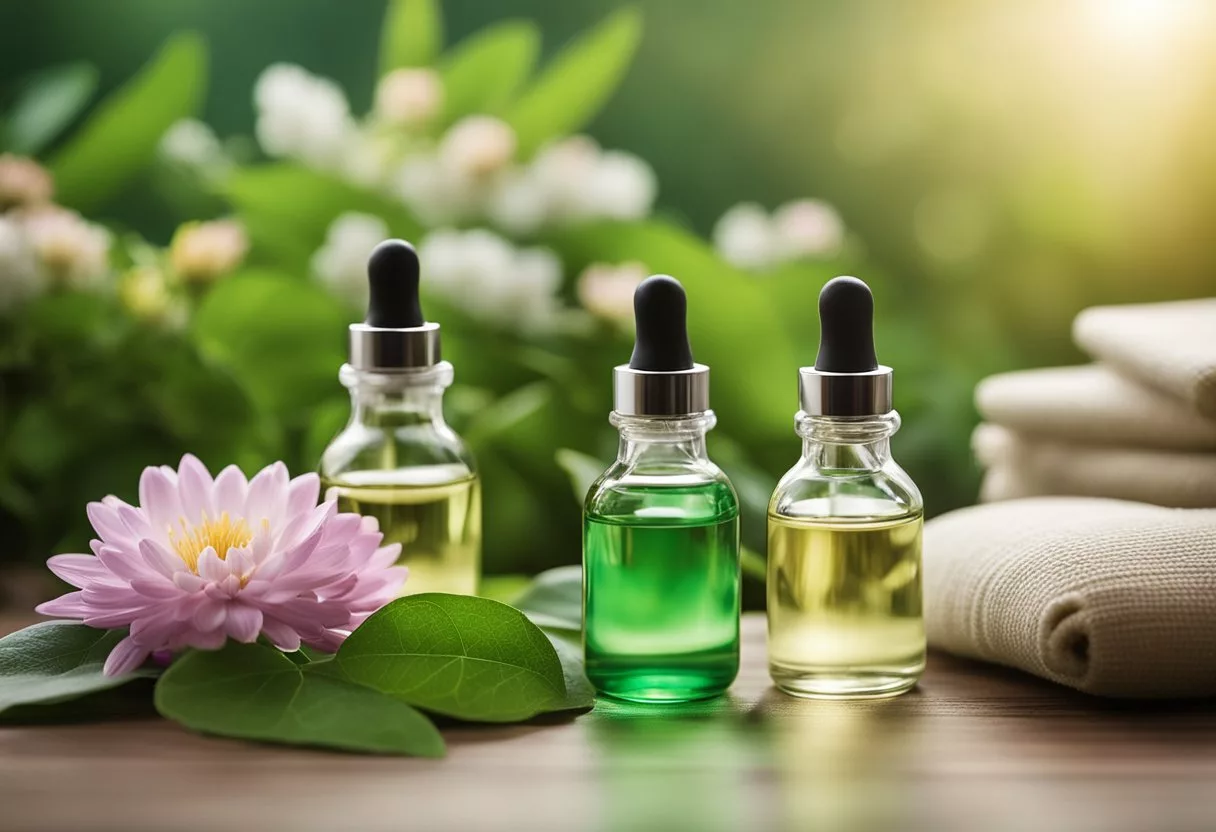
Some essential oils may help reduce stress and promote relaxation, which can ease tinnitus discomfort. Lavender oil is often recommended for its calming properties and ability to reduce stress and anxiety, which may worsen tinnitus. Other oils like juniper berry and helichrysum are also believed to have beneficial effects.
Using essential oils for tinnitus involves proper application methods and safety precautions. It’s important to dilute oils correctly and choose the right application technique, such as diffusion or topical use. While essential oils may offer some relief, they should be used as part of a comprehensive approach to managing tinnitus.
Key Takeaways
- Essential oils may help manage tinnitus symptoms by promoting relaxation and reducing stress
- Proper application and safety measures are crucial when using essential oils for tinnitus relief
- Essential oils should be used alongside other tinnitus management strategies for best results
Understanding Tinnitus
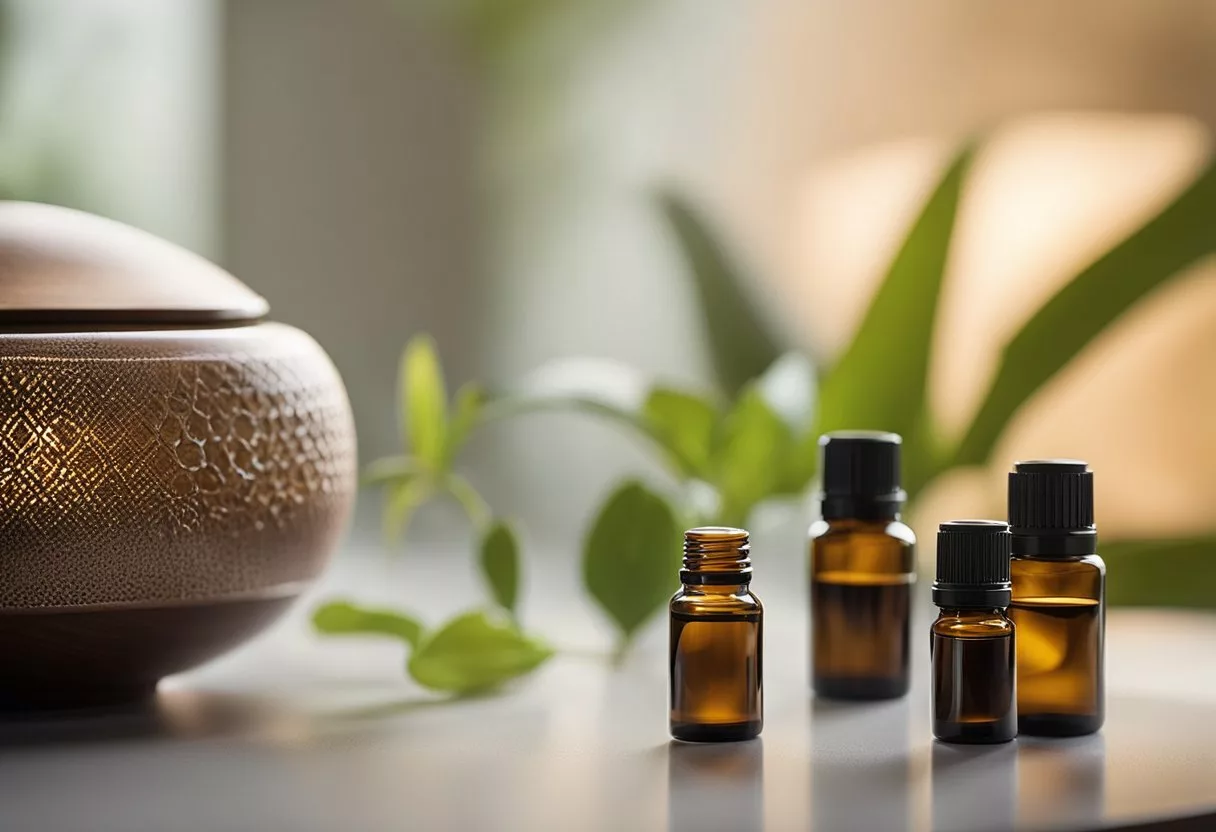
Tinnitus is a condition where people hear sounds that aren’t coming from outside their body. It often feels like ringing in the ears, but can also be buzzing, humming, or other noises.
Causes and Symptoms
Tinnitus has many possible causes. Exposure to loud noises can damage the tiny hair cells in the inner ear, leading to tinnitus. Age-related hearing loss is another common cause. Some people get tinnitus from too much ear wax buildup.
Other factors that can cause or worsen tinnitus include:
• Head or neck injuries • Certain medications • High blood pressure • Stress and anxiety
The main symptom is hearing sounds when there’s no external source. These sounds may be constant or come and go. They can range from quiet to very loud and interfere with daily life.
Common Treatments for Tinnitus
There’s no cure for tinnitus, but many treatments can help. Seeing an audiologist is often the first step. They can check for underlying causes and suggest treatments.
Some common tinnitus treatments include:
• Hearing aids to amplify outside sounds • Sound therapy to mask the tinnitus noise • Cognitive behavioral therapy to cope with symptoms • Relaxation techniques to reduce stress
Lifestyle changes can also help. Limiting caffeine and alcohol, exercising, and getting good sleep may reduce tinnitus. For some, alternative treatments like acupuncture or essential oils provide relief.
The Role of Essential Oils
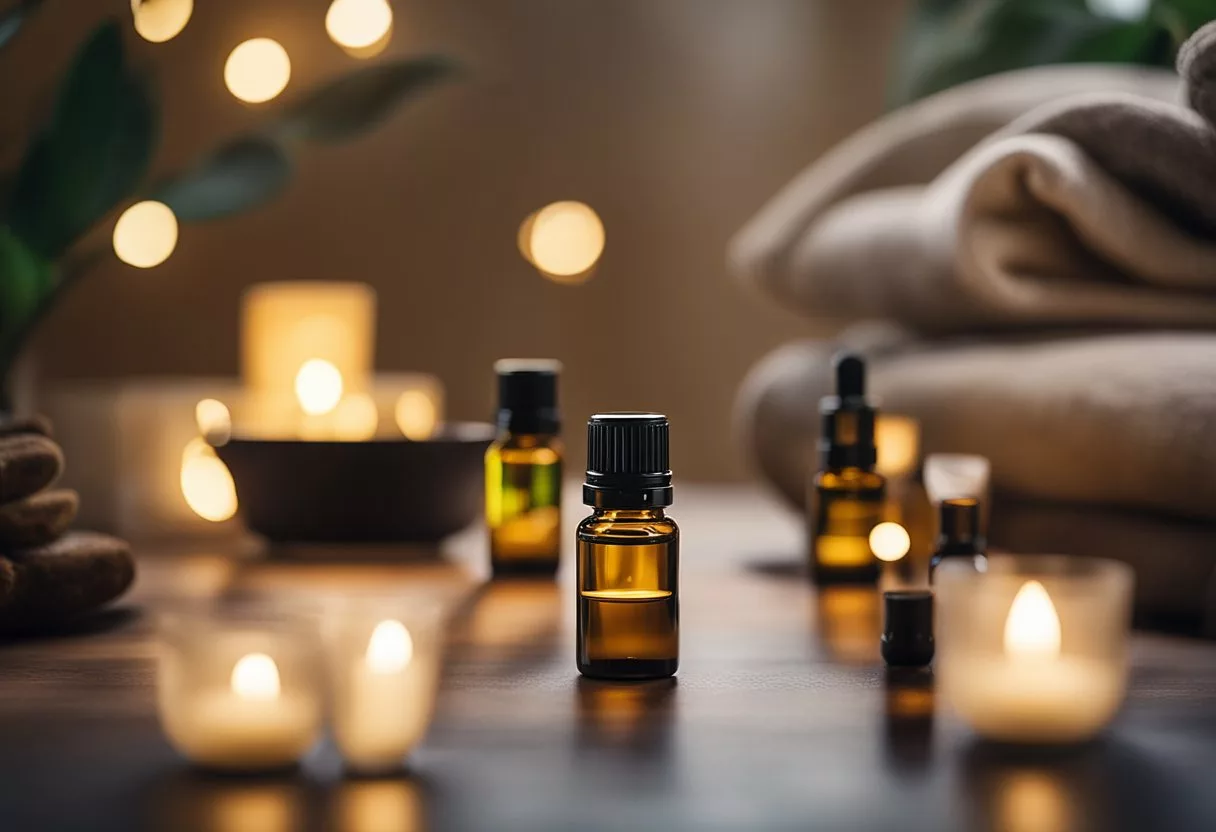
Essential oils have many uses for health and wellness. They may help with tinnitus symptoms in several ways.
Properties of Essential Oils
Essential oils are concentrated plant extracts with strong aromas. They contain aldehydes, ketones, and alcohols that give them therapeutic properties. Many essential oils have anti-inflammatory and analgesic effects.
Some oils like lavender can promote relaxation. Others like peppermint may improve focus and concentration. These effects could help manage tinnitus symptoms.
The chemical makeup of each oil determines its properties. For example, oils high in esters tend to be calming. Those with more terpenes often reduce inflammation.
How Essential Oils Can Help with Tinnitus
Essential oils may provide relief from tinnitus in a few key ways. Their anti-inflammatory properties could reduce swelling that contributes to tinnitus.
Lavender oil can help calm the mind and body, potentially easing stress that worsens tinnitus. Juniper berry oil may improve focus disrupted by tinnitus.
Aromatherapy with essential oils could create a pleasant distraction from tinnitus sounds. Inhaling oils from a diffuser or applying them topically may offer benefits.
While research is limited, some people report symptom improvement with essential oil use. It’s best to consult a doctor before trying oils for tinnitus.
Popular Essential Oils for Tinnitus

Some essential oils may help relieve tinnitus symptoms. These oils have unique properties that can reduce stress, improve circulation, and ease inflammation.
Helichrysum Essential Oil
Helichrysum is often called the best essential oil for tinnitus. It may repair blood vessels and nerves. This oil also reduces inflammation and can help drain excess fluids.
People use helichrysum to relieve pressure in the ears. It may improve blood flow to the area. This can reduce ringing sounds.
To use helichrysum oil:
- Mix 2-3 drops with a carrier oil
- Gently massage behind and around the ears
- Apply twice daily for best results
Lavender Essential Oil
Lavender is known for its calming effects. It helps reduce stress and anxiety, which can make tinnitus worse.
The oil promotes relaxation and better sleep. Many tinnitus sufferers find it harder to sleep, so lavender can be helpful.
Ways to use lavender oil:
- Add a few drops to a diffuser
- Mix with a carrier oil and massage temples
- Put 1-2 drops on a pillow before bed
Lavender’s soothing scent may distract from tinnitus sounds. This can make symptoms feel less intense.
Cypress Essential Oil
Cypress oil improves circulation. Better blood flow can help reduce tinnitus symptoms. It also has a calming effect on the nervous system.
This oil may ease congestion in the ears. It can help clear blockages that contribute to tinnitus.
To use cypress oil:
- Mix 3-4 drops with a carrier oil
- Massage gently around the ears and neck
- Use once or twice daily
Cypress oil blends well with other oils like lavender or juniper berry.
Juniper Berry Essential Oil
Juniper berry oil has anti-inflammatory properties. It can help with tinnitus caused by inflammation. The oil may reduce swelling in the ear canal.
This oil also acts as a natural detoxifier. It can help remove toxins that may contribute to tinnitus.
Ways to use juniper berry oil:
- Add 2-3 drops to a warm compress
- Apply compress to ears for 10-15 minutes
- Repeat once or twice daily
Juniper berry oil has a fresh, woody scent. Some find this aroma helpful for stress relief.
Basil Essential Oil
Basil essential oil may improve circulation to the ears. Better blood flow can reduce tinnitus symptoms. It also has antibacterial properties.
This oil can help with ear infections that cause tinnitus. It may reduce inflammation in the ear canal.
To use basil oil:
- Mix 2-3 drops with coconut oil
- Gently massage around the outer ear
- Do not put directly in the ear canal
Basil oil has a strong scent. Start with a small amount to see how you react. Always dilute before applying to skin.
Using Essential Oils Safely
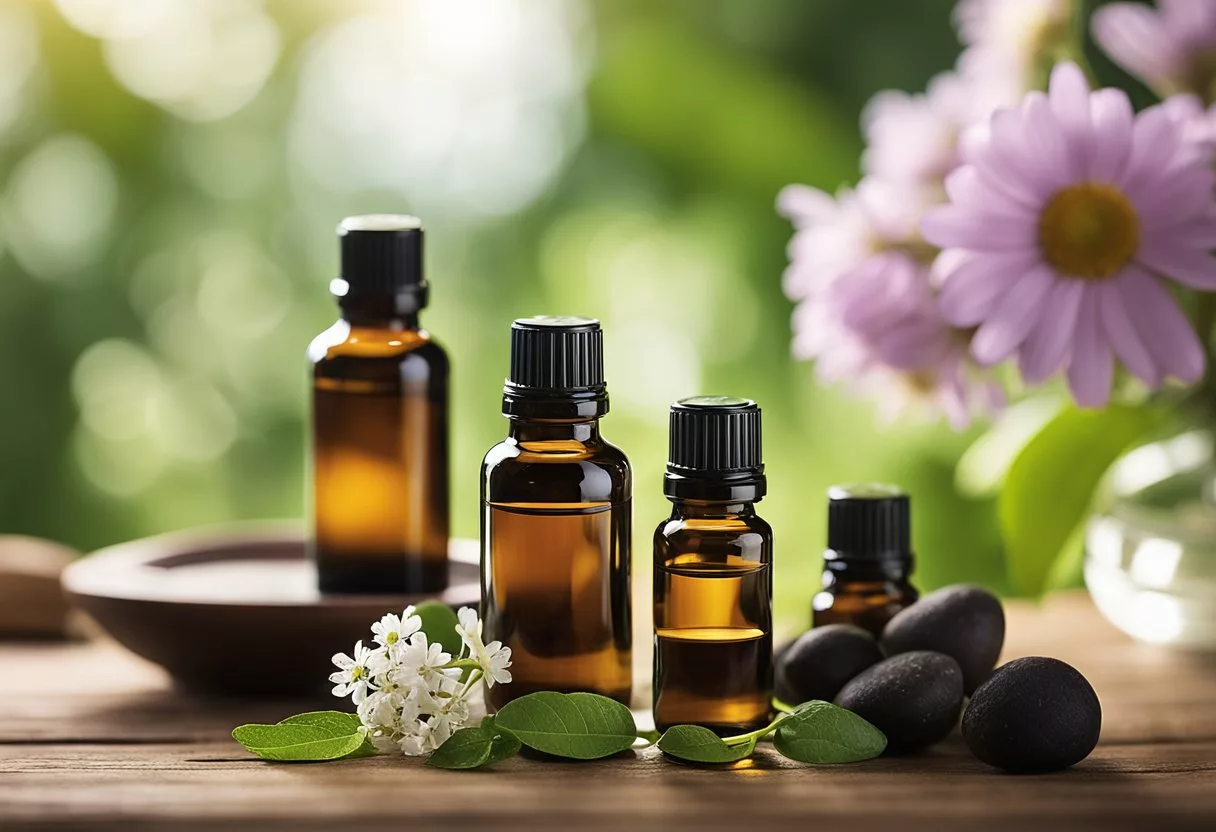
Essential oils are potent substances that need careful handling. Proper dilution, awareness of side effects, and professional guidance are key for safe use.
Dilution with Carrier Oils
Essential oils are very strong and can irritate skin if used directly. Always mix them with a carrier oil before applying to the skin. Good carrier oils include almond oil and olive oil.
For adults, use 2-3 drops of essential oil per teaspoon of carrier oil. This creates a safe 2-3% dilution. Children and seniors may need an even weaker mix.
Never apply undiluted essential oils to the skin or consume them orally without expert advice. Proper dilution helps prevent skin reactions and allows for safer, more effective use.
Potential Side Effects
While generally safe when used correctly, essential oils can cause side effects in some people. Common reactions include skin irritation, allergic responses, and headaches.
Some oils like lavender essential oil may interact with medications. Pregnant women, children, and pets can be more sensitive to essential oils.
Watch for signs of irritation like redness, itching, or swelling. If you experience any negative effects, stop use immediately and wash the area with mild soap and water.
Consulting Professionals
Before using essential oils for tinnitus, talk to a healthcare provider. They can advise on safe use and potential interactions with medications or health conditions.
An aromatherapist or naturopath with essential oil expertise can recommend specific oils and blends for tinnitus. They’ll consider your overall health and any sensitivities.
The Food and Drug Administration doesn’t regulate essential oils. This makes professional guidance even more important for safe, effective use.
Always buy high-quality oils from reputable sources. Look for pure, organic options when possible to minimize exposure to harmful additives or pesticides.
Application Methods for Tinnitus Relief
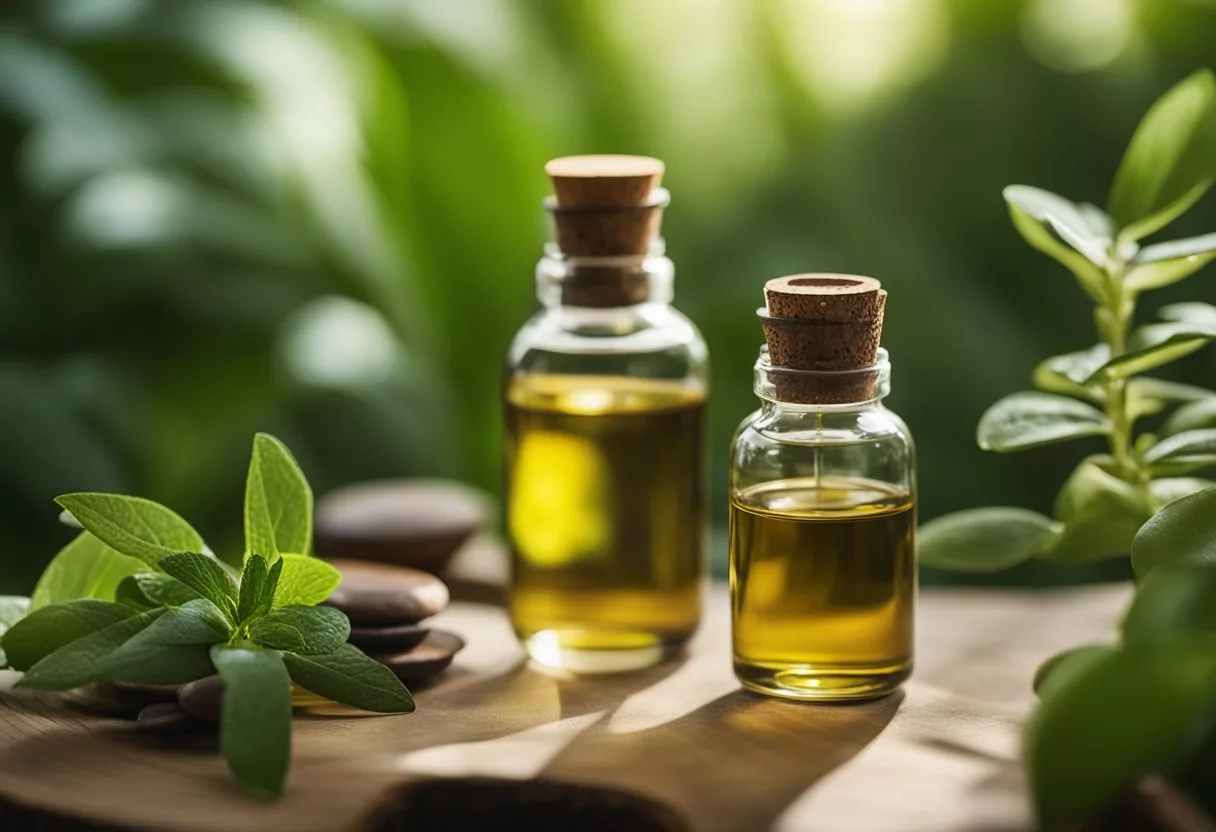
Essential oils can be applied in different ways to help ease tinnitus symptoms. The right method can make a big difference in how well the oils work.
Topical Application
Topical use of essential oils may help reduce tinnitus discomfort. Mix a few drops with a carrier oil like coconut or jojoba. Apply the blend gently around the ears, neck, and temples. This can help ease tension and promote relaxation.
For earaches, put 1-2 drops of diluted oil on a cotton ball. Place it just outside the ear canal. Do not put oils directly in the ear.
A gentle massage using essential oil blends may help relieve tinnitus-related stress. Focus on the neck, shoulders, and behind the ears. This can improve blood flow and ease muscle tension.
Aromatherapy and Inhalation
Inhaling essential oils can help calm the mind and reduce tinnitus symptoms. Use a diffuser to spread the scent throughout a room. This method works well for oils like lavender that promote relaxation.
Steam inhalation is another option. Add a few drops of oil to a bowl of hot water. Drape a towel over your head and breathe in the steam. This can help open up the eustachian tubes and ease congestion.
For quick relief, inhale directly from the bottle. Take a few deep breaths when tinnitus symptoms flare up. This can provide fast, on-the-go support.
Recipes for Blends and Applications
Creating custom blends can target specific tinnitus symptoms. Here are some simple recipes to try:
Calming Ear Oil:
- 2 drops lavender oil
- 1 drop cypress oil
- 1 tablespoon carrier oil
Mix and apply around the ears and neck before bed.
Tension Relief Blend:
- 3 drops peppermint oil
- 2 drops eucalyptus oil
- 1 drop rosemary oil
- 2 tablespoons carrier oil
Use for neck and shoulder massages to ease tinnitus-related tension.
Diffuser Blend for Focus:
- 3 drops lemon oil
- 2 drops frankincense oil
- 2 drops basil oil
Add to a diffuser when tinnitus affects concentration.
Additional Natural Remedies for Tinnitus
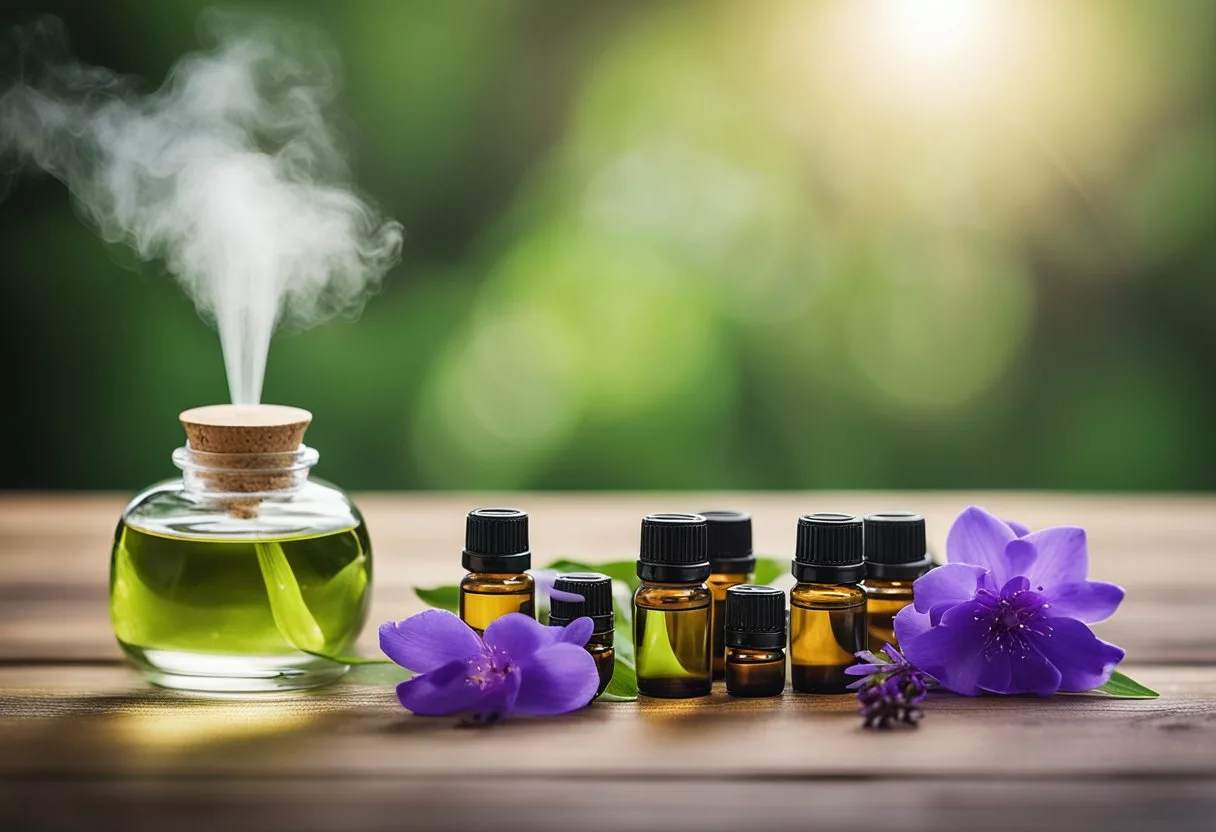
Some natural approaches can help manage tinnitus symptoms. These include herbal supplements, teas, and lifestyle changes that focus on overall wellness.
Herbal Supplements and Teas
Herbal supplements may offer relief for tinnitus sufferers. Ginkgo biloba is a popular choice. It might improve blood flow to the inner ear.
Green tea contains antioxidants that could reduce inflammation. This may help ease tinnitus symptoms.
Lemon balm tea has calming properties. It can reduce stress, which often worsens tinnitus.
Caution is important when trying supplements. They can interact with medications. It’s best to consult a doctor before use.
Lifestyle Changes Focused on Wellness
A holistic approach to wellness can impact tinnitus. Regular exercise improves blood circulation. This may reduce tinnitus intensity.
Stress management is crucial. Yoga and meditation can help. These practices promote relaxation and may lessen tinnitus awareness.
Diet changes can make a difference. Reducing salt, caffeine, and alcohol intake might help. Some people find relief by avoiding certain foods.
Getting enough sleep is important. Poor sleep can worsen tinnitus symptoms. Creating a quiet, comfortable sleep environment can help.
Protecting ears from loud noises is essential. This prevents further damage and may reduce tinnitus severity.
Improving Circulation and Reducing Inflammation
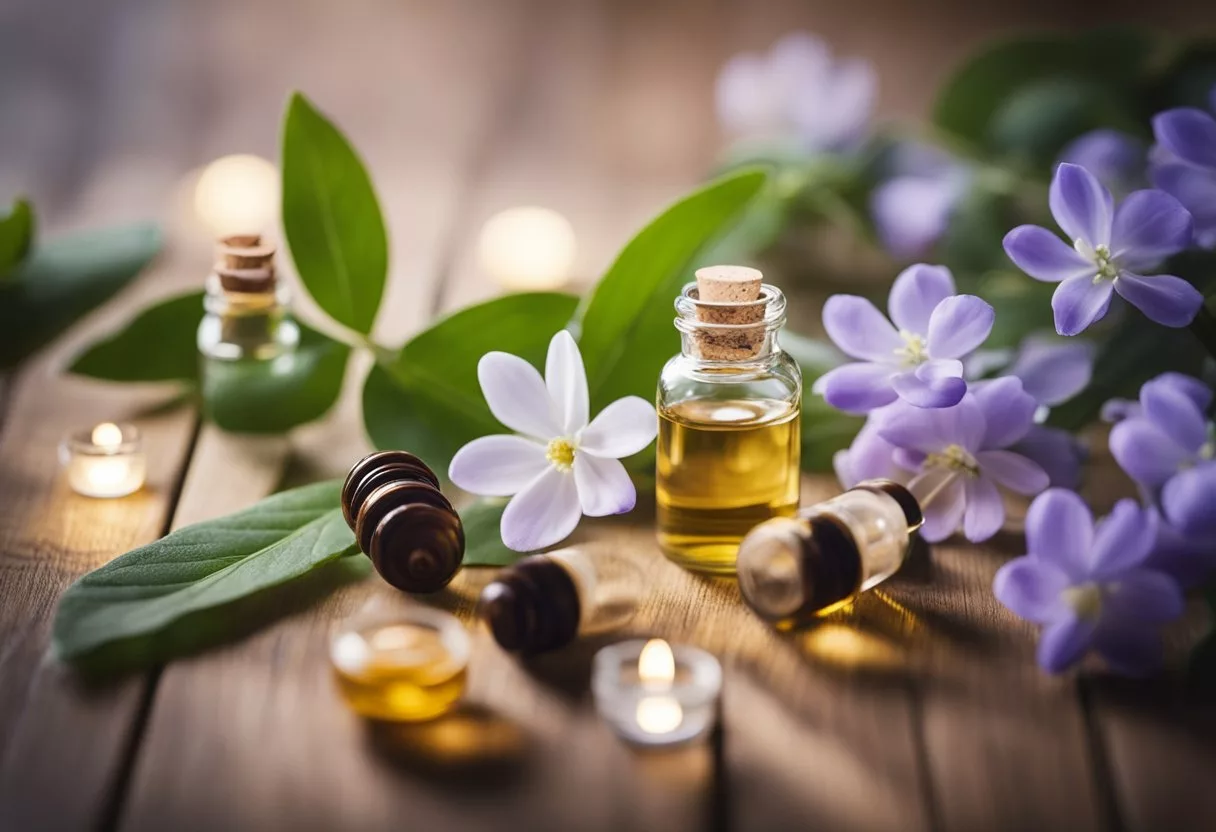
Essential oils can help improve blood flow and reduce swelling in the ears. This may ease tinnitus symptoms for some people.
Rosemary oil is known for boosting circulation. It gets blood moving to the ears and brain. This increased flow might help quiet ringing sounds.
Cypress oil also promotes better blood flow. It can reduce fluid buildup and congestion in the ears.
Some oils have anti-inflammatory effects:
- Lavender
- Helichrysum
- Frankincense
These oils may help reduce swelling that contributes to tinnitus.
Peppermint oil acts as a natural pain reliever. It can ease discomfort linked to ear inflammation.
To use these oils:
- Mix 2-3 drops with a carrier oil
- Gently massage around the ears and neck
- Apply twice daily
Never put essential oils directly in the ear canal. Always dilute them first.
Juniper berry oil offers detoxifying benefits. It may help clear toxins that affect ear health.
While research is limited, many find relief using these natural remedies. Essential oils can be a gentle way to support ear health and potentially reduce tinnitus symptoms.
Frequently Asked Questions
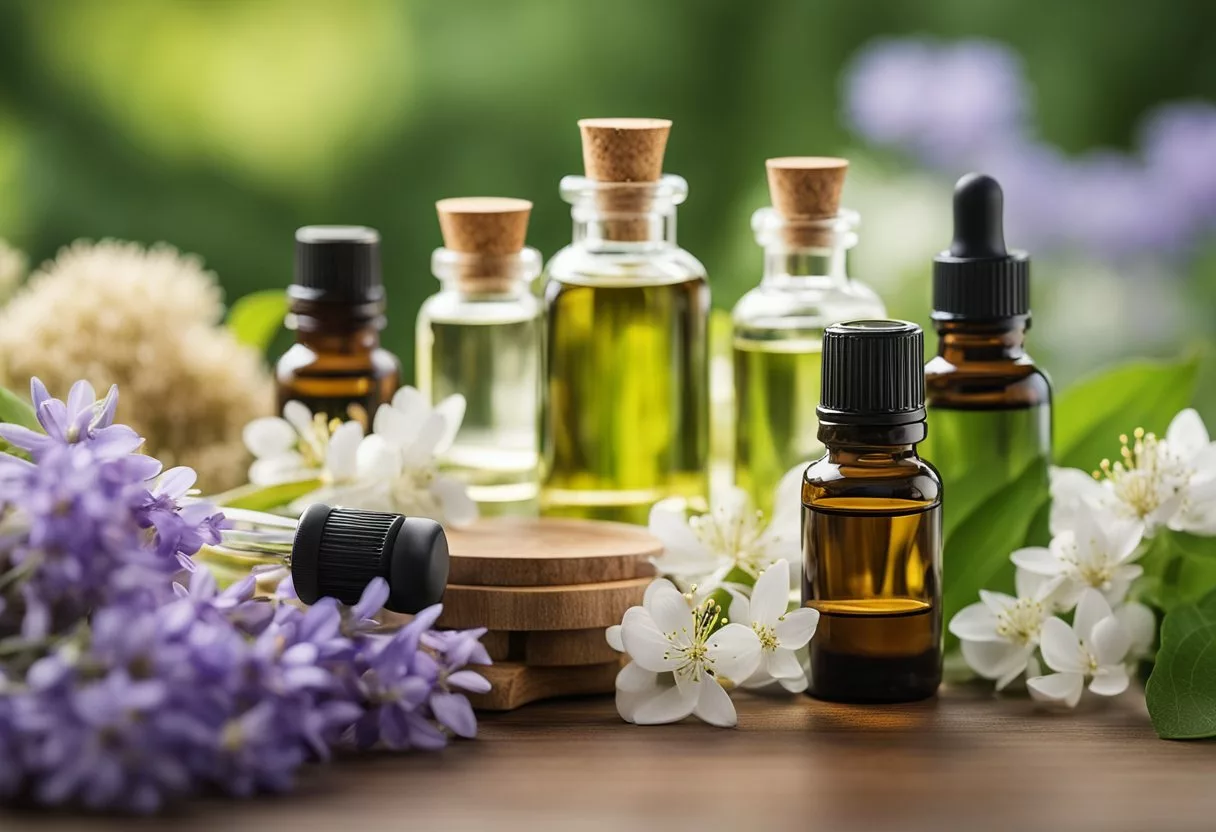
Essential oils offer potential relief for tinnitus sufferers. Many people find certain oils helpful in managing symptoms and improving quality of life. Proper application methods and safety considerations are important when using these natural remedies.
What are the most effective essential oils for managing tinnitus symptoms?
Lavender oil is popular for tinnitus due to its calming properties. It may help reduce stress and anxiety linked to tinnitus.
Cypress and helichrysum oils are also thought to be beneficial. Some users report these oils help decrease tinnitus intensity.
Peppermint oil could provide a cooling sensation that distracts from tinnitus sounds. Ginger oil may improve circulation, potentially easing symptoms.
What is the proper method for applying essential oils to alleviate tinnitus?
Diluting essential oils with a carrier oil like olive oil is important for safe use. A common method is adding 1-2 drops of essential oil to 1/4 teaspoon of carrier oil.
This mixture can be applied behind the ear or on the neck and temples. Gentle massage helps absorption.
Diffusing oils or inhaling them from a cotton ball are other options. These methods allow the aromatic compounds to be absorbed through the nose.
Can essential oils be safely used inside the ear canal for tinnitus relief?
Putting essential oils directly into the ear canal is not recommended. This can cause irritation or damage to the delicate ear structures.
Instead, oils should be applied around the outer ear area. Behind the ear, on the neck, or on the temples are safe spots.
If considering any internal use, it’s crucial to consult a healthcare professional first. They can provide guidance on safe practices.
Which essential oils are supported by user testimonials in reducing tinnitus discomfort?
Many tinnitus sufferers report positive experiences with lavender oil. Its relaxing effects may help manage stress related to tinnitus.
Helichrysum oil has gained attention for potentially reducing tinnitus intensity. Some users claim it helps lessen the ringing sensation.
Cypress oil is another frequently mentioned option. Users report it may help improve circulation and ease tinnitus symptoms.
What natural remedies, including essential oils, provide quick relief from tinnitus?
Essential oils like peppermint or lavender may offer quick relief for some people. Their scents can be calming or distracting from tinnitus sounds.
Ginger tea or supplements might help by improving blood flow. This could potentially reduce tinnitus intensity for some individuals.
White noise machines or nature sounds can mask tinnitus. This provides immediate relief for many sufferers.
How can helichrysum oil be used in the treatment of tinnitus?
Helichrysum oil can be diluted and applied behind the ear or on the temples. A 2-3% dilution in a carrier oil is typically recommended.
Some people add a few drops to a warm compress and apply it to the affected area. This may help improve local circulation.
Inhaling helichrysum oil from a diffuser is another method. This allows the aromatic compounds to be absorbed through the respiratory system.